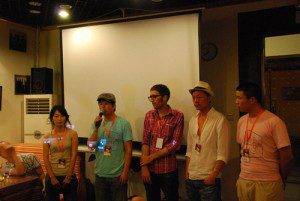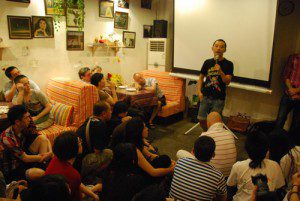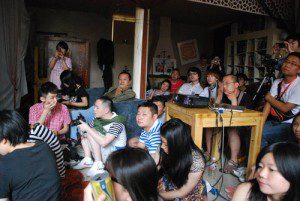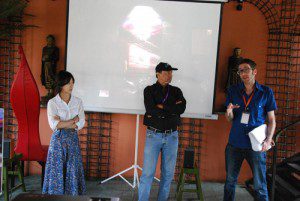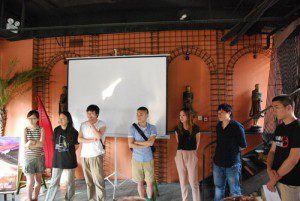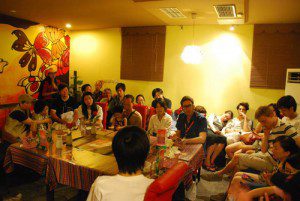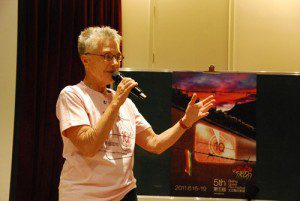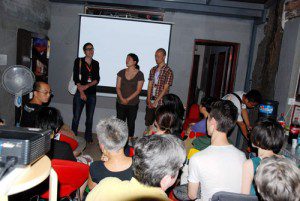媒体通稿
2011年6月19日,北京
第五届北京酷儿影展组委会
北京酷儿影展游击战
2011年6月19日周日晚,北京酷儿影展成功结束了五天在京城内的流动式放映及讨论。
在影展开幕前三天,中国官方正式通知组委会要求叫停影展,并警告他们届时会去原先计划的影展放映场地-东珍书院进行检查。但组织者们拒绝就此放弃,于是连夜找到了在北京城内的多个酒吧和咖啡馆作为临时放映场地。通过采取对放映场地和日程实行严格的安全保护措施,组委会在接下来的影展期间内成功地摆脱了官方的干预。
包括多位国内外知名酷儿影像创作者在内的超过500位观众参加了影展活动,放映影片超过30部,组织映后讨论数十次。
或许正是官方的阻挠和强制取缔,北京酷儿影展才更加成功彻底地实现了它的使命:在一个非主流的声音总被扼杀掉的社会里不仅需要酷儿影像,更需要让这些酷儿影像被人看到,被广泛传播。
自创办伊始,北京酷儿影展(www.bjqff.com)十年来一直遭受着来自官方的打击。2001年由一群北大的学生发起,在不断有新鲜血液加入的一个志愿团队的坚持下,影展平均每两年举办一次。前两届影展均遭到官方的阻挠和禁止,组织者被迫转战地下,让影展远离政府监控的视线。
分别举办于2007年和2009年的第三届和第四届影展则相对顺利。在位于北京远郊区的艺术家群落-宋庄,影展的举办并未遇到警察或国家安全机构的任何阻扰。这样的成功经验激励了组织者们去筹划2011年更大规模的一届影展。
然而2011年4月,组委会却不得不调整了最初的举办计划。原本应该在5月份举行的第八届中国纪录片交流周被官方叫停,这意味着宋庄不再是非主流艺术可以无忧无虑的伊甸园。很快,京城的很多文化艺术场地也遭遇了来自政府更严格的监控。
“宋庄之后,我们也和其他的放映场地达成了合作协议。然而之后,这些场地的负责人一个个地告诉我们,举办北京酷儿影展对他们来说过于冒险。他们害怕被官方关闭,于是告诉我们不能再与影展合作。” 2011年北京酷儿影展组委Stijn Deklerck如是说。
组委会最终决定在东珍书院举办影展,那是位于北京西城区的一个民间组织活动场地。出于对整个文化恐怖形势的担心,组织者决定不公布影展举办场地的确切名称和地址,仅公布放映时间表。而观众只有在预订观影座位之后才会获知确切的场地信息。
6月12日,周日,现实证明所有为保证影展安全所采取的措施都不足以避免官方对影展的阻挠。北京市西城区公安局分局、文化委和工商局执法队的官员在毫无预知的情况下出现在东珍书院,并要求与影展组织者立即进行谈话。在简短的交谈之后,官员们含混地列举出一些中国的法律法规,从而说明电影节是非法的,必须予以取缔。他们告知组委会接下来在影展计划举办期间会派出警察在东珍书院盯守,并警告说如果组委会违抗他们取缔影展的命令,后果将会十分严重。
组委会召开了紧急会议,在会议上所有组委成员一致决定变换场地继续举办影展。
“北京酷儿影展的创办是为了提供一个可以质疑、挑战主流文化的平台。因为在中国,主流文化是被官方所建构的,我们觉得自己有责任不让影展在政府的压力之下保持沉默,什么样的电影才被允许播映不是只有政府才说了算的事情。”2011年影展组委会成员以及影展创始人之一崔子恩说道。
离影展预计的6月15号开幕仅剩下3天,组委会开始在整个京城寻找各种可能进行影片放映的酒吧和咖啡馆。由于不确定官方是否会找到新的放映地点,组织者决定避免把影展全部活动集中在一个场地。
组委会成员之一范坡坡如此形容影展开幕前的气氛:“对于官方找到影展的举办场地东珍书院这件事我们感到非常震惊,因为在此之前我们从未对外公布影展会在那里举行。更可怕的是,官方竟然也了解到我们此前与其他放映合作场地的谈话。所以,我们决定必须采取新的安全策略,而其中一个方法就是在影展举办的5天当中持续更换地点。”
6月15号影展在组委会忐忑的心情下紧张开幕,接下来举办了连续5天令人振奋并发人深思的放映及讨论。虽然原本计划的影片放映未能全部实现,仍然有超过30部影片通过以下4个主题单元的形式被放映:导演主页、海外国族、友朋自有邦来和本土放映(包括短片、长片剧情和纪录片)另外还安排有一个北京酷儿影展十周年回顾的特别单元,包括放映一部关于北京酷儿影展过去十年所经历的风雨波折、并由历届组委会自行拍摄记录的纪录片,和一个主题论坛,重点讨论酷儿影展未来在亚洲的发展建设。此外,除去影展的开闭幕式,组委会还安排了影展期间3个晚上的特别派对活动。
来自中国大陆以外的8位国际电影人及策展人在影展期间分享了他们的影片和创作、策划经验,其中包括国际著名的美籍酷儿影像先锋芭芭拉汉默,卡西什-孟买国际酷儿影展策展人斯利达朗加安,台湾同志纪录片导演陈俊志,加拿大籍华人录像艺术家翁云青等。超过15位大陆本土的影像创作者出席放映,并参与映后讨论,他们的影片大部分是在国内的公开首映。此外,影展第一次接待了25名来自中国较偏远地区的外地观众,他们得到资助前来北京观看酷儿及LGBT主题的影片,在他们各自的家乡这还是一种不能实现的奢侈。总共超过500位观众参与了影展的放映活动,并共同骄傲地庆祝了这个特别值得纪念的时刻。
在影展闭幕之时,组委会成员在一起回顾了异常成功的这第五届北京酷儿影展。
“虽然很不幸地,我们再一次不得不以打游击战的方式来举办影展,观众和电影人们的回应却让我们自己备受鼓舞和激励。我们已经准备好在整个中国社会继续传播酷儿影像和酷儿文化。”本届北京酷儿影展轮值主席杨洋代表组委会做出如是声明。
她在给本届影展的致辞中写道:“[…] 我们最大的敌人,其实是少数人的权力机构通过强大的国家机器宣教而长期潜移默化建构起来的大众主流意识形态。而质疑、对抗这种”主流“意识形态,也正是酷儿影展存在的价值和追求的目标。[…] 革命尚未成功,酷儿仍需努力!”
PRESS RELEASE
Beijing, 19 June 2011
The Beijing Queer Film Festival Organization Committee
Beijing Queer Film Festival Goes Guerilla
On Sunday 19 June 2011, the Beijing Queer Film Festival successfully closed its fifth edition after 5 days of guerilla-style screenings and talks around the city.
3 days prior to the start of the festival, Chinese authorities had told the organizers to cancel the festival, warning them that they would be watching the Dongjen Book Club where the festival was supposed to take place. The organizers refused to lay down however and hurried to find several alternative screening locations in bars and coffee-houses around Beijing. By implementing strict safety measures surrounding the publication of screening times and places, they managed to stay out of the hands of the authorities for the duration of the festival.
More than 500 people, including an impressive array of Chinese and foreign queer filmmakers, attended the festival which showed more than 30 queer-themed films and held numerous talks.
Despite and perhaps even thanks to the ban imposed by the authorities, the Beijing Queer Film Festival succeeded in what it set out to do: celebrate queer film and celebrate the necessity of showing queer films in a society where non-mainstream voices are stifled all too often.
During its 10-year-long existence, the Beijing Queer Film Festival (BJQFF,www.bjqff.com) had its fair share of official trouble. Started in 2001 by a group of Peking University students, the festival has been organized every other year by a changing group of volunteers. Its first 2 editions were all marked by official interruptions and bans, forcing the organizers to keep their festival underground and far away from official eyes.
The 3rd and 4th edition, held in 2007 and 2009, were more successful. Held in Songzhuang village, an artist community just outside of Beijing, they both took place without overt harassment from police or national security. It encouraged the organizers to think bigger as they prepared for a large scale 2011 edition.
In April 2011, they had to adjust their plans however. The official cancellation of DOChina, an independent documentary film festival scheduled to take place in May, signaled that Songzhuang village wasn’t a safe haven anymore for non-mainstream art happenings. As it soon turned out, other art locations around Beijing were also experiencing a severe climate of government control and censorship.
“Apart from Songzhuang, we also made screening agreements with several other locations. One by one they told us however that hosting the Beijing Queer Film Festival was too risky. They were afraid of being shut down by the authorities, and they told us that they didn’t want to work with us anymore.”, says Stijn Deklerck, member of the 2011 BJQFF Organization Committee.
The organizers finally decided to hold their festival at the Dongjen Book Club, an activity center in Beijing’s Xicheng District. Worried by the overall climate of fear, they decided not to publicize the exact name and address of the new festival location. Only the times of the screenings were publicized, and people could only obtain the screening address after booking a seat for the festival.
On Sunday 12 June, it became evident that the safety measures adopted were far from enough to keep the authorities at bay. Representatives of the Beijing Xicheng District Public Security Bureau, Culture Bureau and Bureau of Industry and Trade turned up unannounced at the Dongjen Book Club and demanded a sit-down with the BJQFF organizers. After a short talk, in which they vaguely cited a number of Chinese laws, they declared that the festival was illegal and that it had to be cancelled. They announced that they would post police officers at the Dongjen Book Club during the festival, and they expressed that there would be harsh consequences if the organizers disobeyed their orders.
In an emergency meeting, the BJQFF Organization Committee unanimously decided to still hold the festival but at a different location.
“The BJQFF was started as a platform to question and challenge mainstream culture. Since mainstream in China is mainly constructed by the government, we all felt a duty to not let the BJQFF be silenced by government bureaus, but to challenge their decisions on which films are acceptable for screening.”, says Cui Zi’En, co-founder of the festival and member of the 2011 organization committee.
With only 3 days left till the festival opening, scheduled on 15 June, the organizers started to engage all kinds of bars and cafe’s around Beijing. Uncertain if the authorities would find out about the new locations, they decided to avoid a concentration of activities at one single space.
Fan Popo, one of the organizers, describes the atmosphere preceding the opening: “We were alarmed by the fact that the officials found out about the Dongjen Book Club, because we never publicized that the festival would take place there. What was even scarier, was that the authorities also knew about the previous talks we had with other screening locations. So we decided we needed some new safety measures, and one of them was to keep switching locations during the 5 days of the festival.”
The organizers also decided to give the outward impression that the festival was indeed cancelled, informing all the people who had already booked seats that the festival wouldn’t take place. Only invited guests, volunteers, personal friends and LGBT organizations were informed about the new schedule and locations.
Nervously starting on 15 June, the Beijing Queer Film Festival managed to hold 5 days of inspiring screenings and talks. Though not all screenings originally scheduled could take place, more than 30 films were screened during the festival in 4 thematic programs: Filmmakers’ Profile, Overseas Nation, Queers from Diverse Cultures and National Panorama (including short, feature and documentary films). A special Beijing Queer Film Festival Retrospective Program consisted of a documentary about the past decade of the BJQFF and a panel discussion focusing on the development and future of queer film festivals in Asia. Apart from the opening- and closing night ceremonies, the festival also managed to bring together a party crowd on 3 different nights of the festival.
8 filmmakers from outside of mainland China personally shared their films and experiences at the festival, including famous queer cinema pioneer Barbara Hammer, Kashish Mumbai International Queer Film Festival organizer Sridhar Rangayan, Taiwanese queer documentary maker Mickey Chen and Chinese-Canadian video artist Wayne Yung. More than 15 Chinese queer filmmakers presented and discussed their work, with many of their films premiering at the festival. In a festival first, 25 people coming from the less-developed parts of China obtained funding to attend the festival, giving them the occasion to watch queer- and LGBT-themed films, an unknown luxury in their respective hometowns. Overall, more than 500 people attended the festival, and proudly celebrated queer film.
At the end of the festival, the organization committee looks back on a very successful 5th BJQFF edition.
“While it is unfortunate that we had to be guerilla-warriors once again in order to hold this festival, we feel empowered and invigorated by the reactions of the audience and the filmmakers, and we’re ready to continue with our goal of spreading queer films and queer culture in Chinese society.”, says Yang Yang, the chairwoman of this year’s Beijing Queer Film Festival.
She sums it all up in her written preface to the festival: “[…] our biggest enemy consists of a small number of authoritarian organizations that are using the powerful national propaganda machine to subtly construct mainstream ideology. And our biggest worth, our ultimate goal as a queer film festival is to challenge and oppose this mainstream ideology. […] The revolution hasn’t succeeded yet. Queers, keep up the good work!”
所有图片由北京酷儿影展组委会提供
All photos provided by the Beijing Queer Film Festival.
图片(1):2011年北京酷儿影展开幕式,组委会成员(从左到右):杨洋、崔子恩、Stijn Deklerck、魏建刚、范坡坡
Caption Photo 1: Members of the 2011 BJQFF Organization Committee (from left to right): Yang Yang, Cui Zi’en, Stijn Deklerck, Wei Jiangang, Fan Popo
图片(2):陈俊志在开幕式讲话
Caption Photo 2: Mickey Chen is speaking at the opening ceremony
图片(3):开幕影片《T婆广场》放映现场
Caption Photo 3: Audience at the opening film screening: <Lesbian Factory>
图片(4):友朋自友邦来之孟买酷儿影展单元放映(从左到右):杨洋,Sridhar Rangayan, Stijn Deklerck
Caption Photo 4: Queers from diverse cultures – Mumbai Queer Film Festival (from left to right): Yang Yang, Sridhar Rangayan, Stijn Deklerck
图片(5):本土导演(从左到右):张若溪,管盛盛,孟诺,彭陌勰,朱艺,杨奇军
Caption Photo 5: Chinese filmmakers (from left to right): Zhang Ruoxi, Guan Shengsheng, Meng Nuo, Moxie Peng, Zhu Yi, Yang Qijun
图片(6):论坛讨论:酷儿影展在亚洲的发展建设
Caption Photo 6: Panel discussion: development of queer film festivals in Asia
图片(7):芭芭拉汉默身着酷儿影展主题T恤在放映交流现场
Caption Photo 7: Barbara Hammer at the Q&A wearing a T-shirt of the queer film festival

